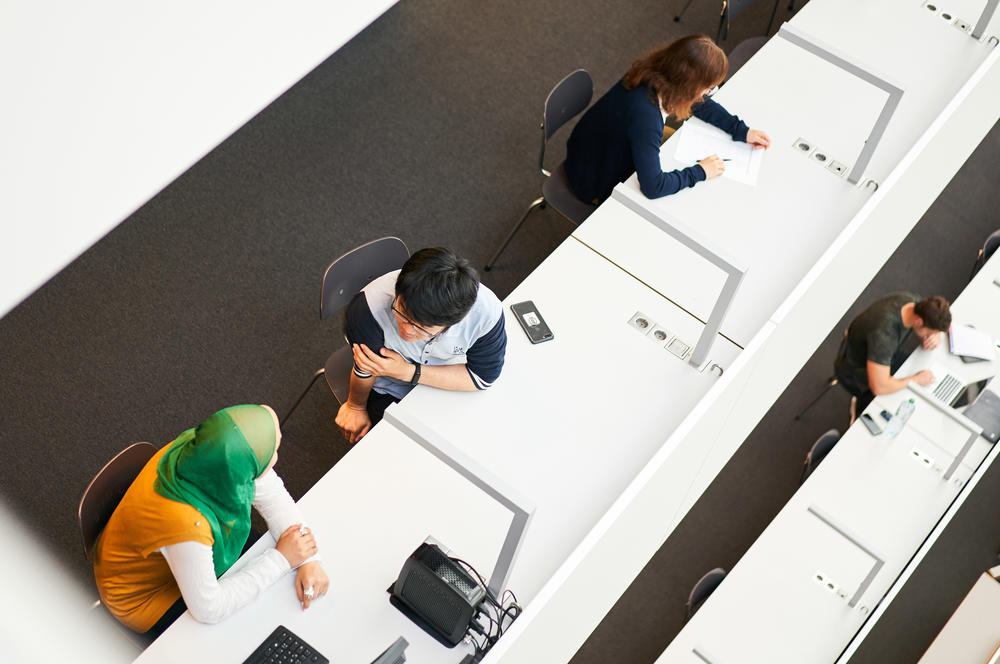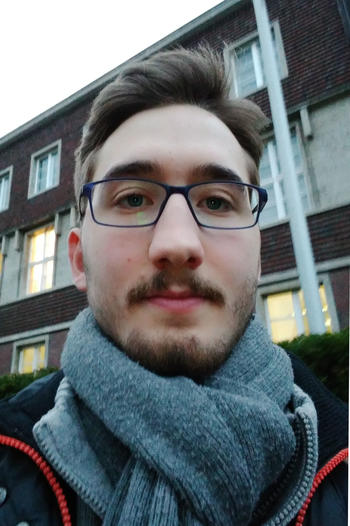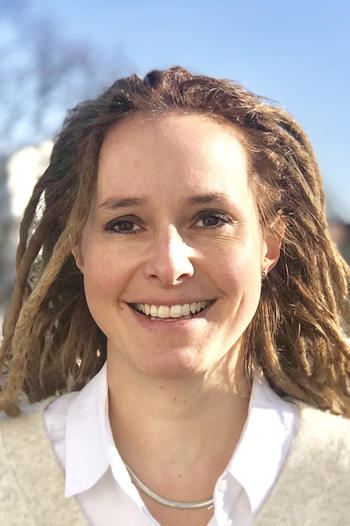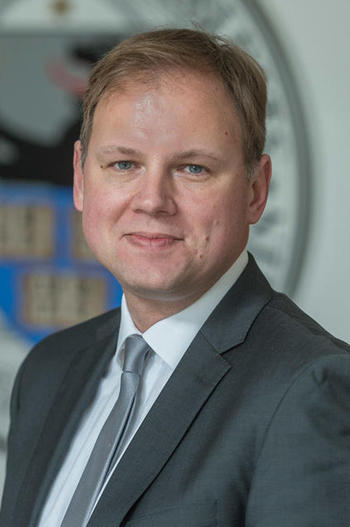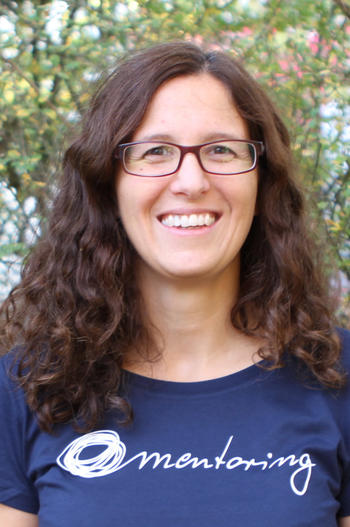An Innovative Look at Teaching, Together
All university members are invited to contribute to a project at Freie University planned to start later this year. The idea is to develop a vision for teaching and education together.
Feb 17, 2020
What characterizes a positive university culture in terms of education? A participative project at Freie Universität aims to open up new possibilities for the future.
Image Credit: DAAD/Jan von Allwörden
What characterizes a positive university culture in terms of education? How should we shape education in the future? How can we get people to value teaching more? An interview with three university members from different corners of Freie Universität: Fabian Krüger, a physics student, Katja Reinecke and Cynthia Heiner, employees, and Professor Hauke Heekeren, Vice President for Teaching, Learning and Academic Development, talked with us in the lead-up to the campus-wide kick-off event scheduled for April 28, 2020, in the Henry Ford Building.
Mr. Krüger, you are a student and member of the LehreN network and are active in the “Future of Teaching and Education” project at Freie Universität. Imagine you only had a couple minutes, say the time between two subway stops – Dahlem-Dorf and Freie Universität/Thielplatz, for example – what would you say to your fellow students in the subway to convince them to participate in the kick-off event, especially if they were already skeptical of the whole project?
Fabian Krüger: You know the saying, “If you don’t vote, you have no right to complain”? Well, I don’t think that’s completely true. Everyone has the right to be critical. Still, it is true that if you do have an opportunity to change something, but don’t take advantage of it, then you are partially responsible for the way things are.
I think the project that the university is launching on April 28 with the kick-off event will certainly bring about some big changes for Freie Universität. There are basically three attitudes people have toward change. Either you are open to change: In that case, you should definitely participate to make sure that the “right” changes happen. Or you are against change: In which case, you should also definitely participate in order to protect the status quo and prevent as much change as possible. Then, of course, there are people who just don’t care if things change: That’s probably a sign that they have a lack of imagination. For example, just imagine if we had compulsory lectures where they took attendance and were scheduled for 4 a.m. on a Saturday—it’s easy enough to think of ways for things to become definitely worse. To put it briefly, not attending is a bad idea.
Dr. Reinecke, you are coordinating teaching qualifications in the SUPPORT project. Imagine you are standing in line at the Mensa and hear someone within earshot complaining that teaching at Freie Universität is worse than ever. What arguments would you use to convince him or her to take part in the kick-off event on April 28 before your meal gets cold?
Dr. Katja Reinecke from the Working Group for Empirical Research in Education.
Image Credit: Personal collection
Dr. Katja Reinecke I would ask the person what they think would have to happen for teaching to improve. That is exactly what the kick-off of this process aims to do: start a conversation so that we can think about teaching and learning at Freie Universität together. If we say that we want to look more closely at teaching, then of course we also need to get to know the skeptical and critical views of those involved. In order to develop new ideas and processes, it is important to identify existing problems precisely.
Professor Hauke Heekeren, Vice President for Teaching, Learning and Academic Development.
Image Credit: Bernd Wannenmacher
Professor Heekeren, Freie Universität will turn 72 years old this year. Please explain in a minute: Why are we thinking about the future of teaching at this point in time?
Hauke Heekeren: After a good 20 years of the Bologna process, we are starting a new, important phase in the development of the university landscape. For example, there are new university pacts, such as the “Future contract for studying and teaching” and “Innovation in university teaching” as well as the development of the Berlin University Alliance.
We want to help shape these processes as protagonists and face any challenges that emerge from them proactively, which is why it is important that we first ascertain what Freie Universität stands for in terms of studying and teaching and how we as a university want to develop it further over the next ten years.
Ms. Heiner, you are a mentoring adviser and educational consultant. Through your contact with students, you are always up to date when it comes to teaching. What is currently going well in teaching? Where does Freie Universität need to make improvements?
Cynthia Heiner: Freie Universität Berlin has great researchers, and many of them are very interested in also being great lecturers. We have a good qualification program that helps teachers learn more about current, evidence-based teaching methods that they can apply.
On the flip side of the coin is the fact that all these committed people take the time to improve their teaching to the benefit of their students, their academic departments, and Freie Universität – and ultimately society as a whole – but their efforts remain largely unrewarded. This is where Freie Universität should start: The university is responsible for the education of the next generation, and there would be no university without the students.
However, the university’s incentive system and the funding structure of institutions, such as the German Research Foundation (DFG) or the European Research Council, convey the bottom line to teaching staff that the time they spend on teaching takes away from their work in research.
The impression is that research is the only thing that really matters, and in the worst case, teaching becomes a burden or only slightly better: it becomes a duty that should be done quickly.
The explicit aim of this active process is to involve the entire university in the project in addition to those already directly involved in teaching, committees, and working groups. You say that you want to hone expertise from everyone at the university – from students, from academic staff, from professors, and from all other employees. How do you propose we do that?
Hauke Heekeren: Freie Universität already has a community of engaged individuals who are dedicated to education and work daily in various capacities to improve our learning and teaching culture. We want to create a forum where they and anyone else who is interested can come and participate in a productive exchange of ideas. Through this open invitation to all university members and through a publicity campaign meant to demonstrate how important education is at our university, we hope to connect with people and motivate them to join in the process.
Professors already spend a great deal of their time teaching. Why is it important that they come to this event in particular?
Hauke Heekeren: The process of developing a mission statement and strategy involves creating a university-wide vision of what education ought to look like at Freie Universität in the future. Professors and other university instructors can contribute expertise from their respective fields as both teachers and researchers. It is an opportunity for them to engage in an intensive dialogue with colleagues from other departments as well as with other people connected to university education. It gives them a chance to provide vital input on how we should develop education. We want professors to help shape Freie Universität’s mission statement for teaching and learning as well as its educational strategy.
If you had to sum it up in just one sentence, what would you say teaching can do?
Katja Reinecke: Teaching can be a spark of inspiration for young people that gets them to start engaging with the world and human potential in a critical and informed way, which is to say scientifically. It can also spark reflection about our problems and our responsibilities as human beings.
Cynthia Heiner: Teaching can unleash the curiosity and the motivation to know more and come up with new ideas.
Fabian Krüger: Teaching can change a person’s life forever – for better or for worse.
Hauke Heekeren: The answer to this question is actually one of the outcomes I hope this process produces, which is why I can only offer a general, personal response. I believe that university teaching is the basis for educating global citizens who will go on in their public and professional lives to represent the values of our university and who will assume social responsibilities in various roles.
What is currently going well in teaching? Where can Freie Universität still make improvements?
Hauke Heekeren: This is another question that we want to discuss and find answers to during the process. What can we at Freie Universität do to ensure that the future of teaching and education is successful? Where do people who care about education see potential to nurture and strengthen established practices and where do they see room for innovation and transformation? I don’t think it would be jumping to conclusions to say that Freie Universität already offers excellent conditions to help us position ourselves for the next ten years. Several indicators point in this direction based on the high number of students from Germany and abroad who apply to Freie Universität and on our recent successes with our partner universities in the Berlin University Alliance and the UNA Europa network.
Katja Reinecke: I know a lot of very committed teachers and have already sat in on many exciting and well-structured classes. But Freie Universität really needs to work on building networks. Young teachers especially seem to be left to their own devices to meet complex demands regarding teaching, advising, and testing. University education is a collective activity, and many of the challenges associated with it must be approached on the departmental level.
Fabian Krüger: Of course, I can only talk about courses that I’ve taken myself. I really like it when there are no attendance sheets. Not because I want to be lazy and not come to class, but I think it is a sign of respect toward the students’ own sense of responsibility and their different individual needs.
I also think it makes sense to give students space at the end of the semester as well as support so that they continue working on topics that interest them from the different modules. Unfortunately, that hasn’t been my usual experience in my degree program. Ironically, Freie Universität needs to work on supporting students’ freedom and independence. I have often had the feeling during my studies that I couldn’t pursue my interests and instead had to take modules that would be of no use to me later in life. Why should we all have to learn the same thing? I think we all stand to benefit from making the most of individual interests and encouraging that kind of diversity.
What stages of the process are being planned for this year and next?
Hauke Heekeren: After the kick-off event on April 28, 2020, during the summer semester, several working groups will deal with content-related contributions for the mission statement and the teaching and learning strategy. Our aim is to discuss the results as part of a wrap-up event together in the summer and include all members of the university.
The first draft based on this input will be shared for discussion as part of our feedback campaign during the winter semester. Once again, we want to reach all the members of the university, all the status groups and interest groups in various locations, departments, central institutes, and central facilities. During the winter semester, we intend to prepare guidelines for teaching based on the feedback we collect for the committees.
What is the attraction of this university-wide kick-off event at the end of April?
Hauke Heekeren: The principles that guided us in the conception and organization of the event are openness, transparency, and participation. We are inviting all interested members of the university to get involved and to define with us the main topics that will shape our guiding principles of teaching.
For me personally, the attraction is the chance to talk with many members of our wonderful university about how we want to develop studying and teaching at our university. I am excited and curious about the perspectives and ideas of students, staff, and colleagues; I am looking forward to listening and discussing together.
Are the students who attend the event excused from classes?
Hauke Heekeren: The process is intended to accompany regular everyday university life; therefore, we have not planned on interrupting classes for the event. We are striving to organize the main events in a family-friendly manner, and we encourage those interested to talk to their instructors, supervisors, or institutions about how participation can be made possible within the framework of the current regulations.
The kick-off event is open to everyone. Why do you think it is important to include everyone?
Cynthia Heiner: I firmly believe in communication. People often forget that they only know their side of things and sometimes only see what benefits or harms them personally. They form broad generalizations based on their personal impressions too easily. I was a student, but that doesn’t mean that my experience is the same as that of my students.
No matter what role we have now – whether students, teaching staff, administrative staff, researchers, technical staff, library employees – we all have our own perspective and responsibility in the teaching and learning process at the university. This event is a genuine opportunity to influence teaching and learning here.
Fabian Krüger: I think that the diversity of this meeting gives it real potential. This is the only way to ensure that fundamental issues are not overlooked.
A brief example: At another university, I had highly motivated teachers ask me what I as a student thought of their fully implemented concept. I spontaneously came up with two or three points where I thought there was room for improvement. I was a little surprised when they said (after I asked) that I was the first student they had asked for feedback. If I, who was not studying at their university, let alone the subject at hand, immediately noticed errors in a well thought out concept, what must it be like for the students directly concerned?
Unfortunately, motivation alone is often not enough. You need to be familiar with the views and opinions of the people involved. That is why I am excited to get to know other perspectives and talk about them with people from different status groups. I also look forward to sharing my views with them.
Katja Reinecke: You are more likely to get people thinking outside the box and find new, creative approaches to familiar situations if you provide a setting for people to come together from different backgrounds and different status groups.
Why should employees get involved who at first glance have nothing to do with teaching, for example those working in administration? What expertise can they contribute?
Cynthia Heiner: The first thing that occurs to me is people in the administration. They exert a great influence on formal processes, and their work thus indirectly influences the teaching and learning process. I am certain that they have suggestions on where friction could be reduced.
Researchers work with students in bachelor’s and master’s degree programs and often volunteer at information events to inspire young people to study their subject.
Library employees and technological support staff do a great deal for the research conducted here, so by extension they also support students. Everyone at the university is part of teaching and learning.
Katja Reinecke: I have an image in my head of a little cartoon with three pictures. On each of them, you can see a figure doing the same thing, hammering a stone. But in each picture, there is something different in the thought bubble. In picture 1, the person is thinking, “I am hammering a stone.” In picture 2, you can see a stained glass window that the stone will be placed in, and the person thinks, “I am making a stained glass window.” In the third picture, you can see the Cologne Cathedral in the thought bubble, and here the person says, “I am involved in creating a cathedral.”
I think all staff members have to decide for themselves to what extent they identify with issues related to teaching and studying. However, their expertise and perspectives are very important for the process because, of course, many of their activities – the functioning or nonfunctioning of the complex administrative processes – have a direct and major influence on studying and teaching.
Ideally, a wide variety of perspectives will come together at the kick-off event. What are some of the ways that the many ideas and impulses will continue to inform the process in the coming months?
Cynthia Heiner: Honestly, I think that will be the hardest part – keeping everyone involved as the months go by. But if you work on something that you really want to change, you will be motivated to continue and bring about results. It can be very rewarding to work with others who are committed to the same thing, teaching and learning. Then, in groups, we can listen to others’ concerns and suggestions and then talk about them. It is all a question of communication.
Fabian Krüger: The best thing is if people with ideas get involved in working groups. I think documenting the different ideas is also important.
Katja Reinecke: Ideally, there will be a strategy process that is not an isolated moment, but rather consists of discussions that are intensified over a longer period. It would encourage the development of new positions and offer opportunities to integrate them into everyday university life. I think that will be crucial for success: Do those involved perceive the whole process as an opportunity to work together toward implementing real change?
Hauke Heekeren: After the kick-off event, working groups will be formed to address specific topics to prepare content for the mission statement and a strategy for teaching and learning. Forming a working group and participating in working groups is open to all the participants in the process so that their perspectives and ideas can be taken into account.
If you had to define your role in the process, what would it be and why?
Katja Reinecke: I would say it’s a kind of coach role: I am here to cheer people on, develop strategies, notice people’s strengths and help them utilize those. I also see myself as a coordinator for developing teaching skills as a way to empower education and teaching staff.
Cynthia Heiner: Well, it’s not just one role. I think that by being part of the process I can also steer it, so that would make me a sort of boss. At the same time, I am trying to make the process more efficient, and that makes me more of a consultant. And then someone has to draft texts for the mission statement or distribute minutes of the meetings, and that is more like a project staff member.
Just like in my position at the university, I am taking over many different responsibilities in this process, and that applies to all of us. Bringing people together in this process can therefore make a real difference.
Hauke Heekeren: As the Vice President for Teaching, Learning and Academic Development, I feel responsible for a process that enables the generation of ideas and input from the entire involved in studying and teaching at Freie Universität. Another way to describe my role would be as an “enabler.”
Fabian Krüger: It might not sound very creative, but I’m just a student in this process. That means that I transfer the skills that I need for studying to the teaching and learning situation at our university. So I am trying to develop an eye for details, to question whether the methods chosen are really suitable for solving problems and, of course, to look for alternative, better solutions.
The plan is to have a mission statement at the end of the process that was developed by all the members of Freie Universität. Without trying to predict the developments of the coming months: How can this type of mission statement be lived in everyday university life? What can set it off?
Hauke Heekeren: The mission statement on teaching should express what we at Freie Universität understand by teaching and education and how we plan to orientate ourselves over the next few years in further developing this important area.
What characterizes a positive university culture in terms of education? What makes teaching and learning at Freie Universität special? What should education at our university look like in 2030? The mission statement for teaching and learning should provide an answer from our community to these questions and serve as a point of reference, for example, in strengthening the quality of our courses, testing innovative teaching formats, or acknowledging good teaching at our university.
Cynthia Heiner: That is not an easy question. I think that while developing the mission statement, we should also consider examples of how it can be put into practice at Freie Universität and how it can be brought to life. I am looking forward to conceptualizing the mission statement and the examples of what it could mean at the university, more so than to the actual wording of the text.
Fabian Krüger: The document is intended to underpin the cultural change that we are seeking with this process in such a way that it will not be possible to fall back to a standstill. I think that no matter how academia and research continue to develop, teaching should also continue to develop.
I hope that by developing a new mission statement, we will create a culture in which debates about teaching methods are the order of the day and in which it is possible to experiment with different methods to see how teaching could be done differently. Ideally, we will not stop with the new mission statement, but continue to strive for new and better teaching. To do so, dialogue between the status groups must be a matter of course and sustained over the long term. I think the mission statement will generate the ambition needed for this to happen.
Katja Reinecke: I think there are many possibilities. It is a good start if instructors, students, and other staff at Freie Universität know that there is a mission statement – and if they refer to it in conversations or when making decisions, for example, how a particular question about teaching should be resolved in a certain subject. If we can establish a new basic approach, then we are not just teaching any old way, but rather, we have formulated goals and expectations for our teaching.
Teaching is a highly professional, academically demanding job, and we work according to the same high standards as in research.
Carsten Wette conducted the interview.
The original interview in German was published in campus.leben, Freie Universität's online magazine, on February 13, 2020.
Further Information
Get involved
All Freie Universität members are welcome to contribute to the “Shaping the Future of Teaching and Education Together” project at various points along the way and through different means. Each person can add their unique perspective and ideas about how to further develop teaching and education at Freie Universität.
Kick-off
The official start of the project is a Kick-off Event
Time and Location
- April 28 from 2 to 5:30 p.m.
- Freie Universität Berlin, Henry Ford Building, Garystraße 35, 14195 Berlin. Subway station: Freie Universität/Thielplatz (U3)
Anyone who is interested is welcome to attend whether they are an instructor, student, research assistant, laboratory staff member, library employee, or administrative staff member. To facilitate planning, we request that you informally register in advance.
The kick-off event is an opportunity for participants to discuss important questions about the future of teaching and education at Freie Universität Berlin. The goal is for them to identify topics that will then be addressed in the following weeks by focus groups, which are also open to all university members.
Join anytime
... Even if you were not able to attend the kick-off event. Of course, you can also choose to just attend the kick-off.
Wrap it up
The focus groups will present their findings at a public wrap-up event that will also provide a forum for further debate. A feedback campaign is planned for the following winter semester, which extends the opportunity, once again, for the entire university to respond to the process so far with praise, critique, and additional ideas.
Freie Universität members are welcome to participate in any or all of these steps. Your participation is also encouraged even if your German is not strong – English as your working language is fine.
The last step in the process is to submit a finalized version of the educational strategy and mission statement to the academic committees for them to debate and approve.
Information about the “Shaping the Future of Teaching and Education Together” project can be found here.
Time and Location
- April 28 from 2 to 5:30 p.m. [postponed]
- Freie Universität Berlin, Henry Ford Building, Garystraße 35, 14195 Berlin. Subway station: Freie Universität/Thielplatz (U3)
Anyone who is interested is welcome to attend whether they are an instructor, student, research assistant, laboratory staff member, library employee, or administrative staff member. To facilitate planning, we request that you

